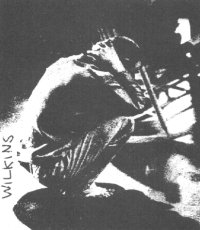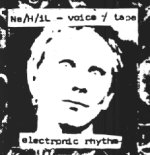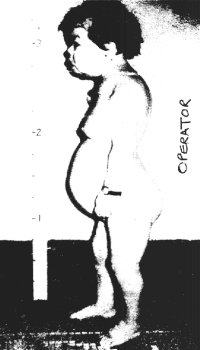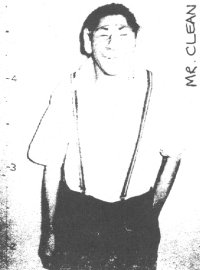Read the
full post by [gay til death] on Industrial Music For Industrial People - The Something Awful Forums...
"...Industrial music is a widely varied style of music which today doesn't really have a common thread other than it sounds 'dark', originally it was experimental, confrontational, abrasive, and vulgar. Started in the late 60s and early 70s by radical 'post-hippie' artists in England (
COUM Transmissions, later becoming
Throbbing Gristle) and San Francisco (
Monte Cazazza, who collaborated with Throbbing Gristle and it's members for many years)), it spread through out the UK and Europe without making a huge impact in the US until the 80s (save for a few artists and mainly in San Francisco with Monte Cazazza, who coined the term Industrial Music, and Boyd Rice).
In the late 60s there was COUM Transmissions, a radical artist collective. The two most important members were
Genesis P-Orridge and
Cosey Fanny Tutti. These two along with
Peter Christopherson (aka "Sleazy", and
Chris Carter they made up the musical aspect of COUM Transmissions. Eventually COUM became Throbbing Gristle. Every Throbbing Gristle show was recorded and eventually released on cassette on their label Industrial Records. These dudes had a huge impact on the experimental music scene in the UK, US and Europe. Like minded individuals and copy cats popped up and a scene was born.
For the next 30 years industrial expanded and evolved (or devolved in some cases), ranging from pop music masquerading as something 'dark' or 'sinister', to some of the most vulgar and abrasive music out there. After Throbbing Gristle broke up and went their separate ways, many said Industrial had died, and thus retroactively we call anything after the TG break up post-industrial (I have to say I don't like this term, it stinks of something made up on Wikipedia or some forum 20 years after the fact).
So! From this point we have a huge amount of music to explore, since dozens of sub-genres have sprung up since TG's last performance. Most notably we have neo-folk, power electronics, electro-industrial, EBM, dark ambient, death industrial, rhythmic noise, darkwave, and minimal wave. This isn't inclusive at all, and a few are debatable, but genre semantics is for nerds.
To get you all started, here are some
important releases with a lil blurb about them.
70s:
Throbbing Gristle - 20 Jazz Funk Greats
Probably their most accessible, if you can call it that. After seven years of chaotic improvised life performances their sound by this point had been channeled and was more 'musical'. Closest thing to this really is Kraftwerk, especially Autobahn, but maybe because both those albums came into my life at the same time.
Throbbing Gristle - Mission of Dead Souls
Their last live performance, historically important.
Throbbing Gristle - Heathen Earth
My favorite release by them probably, I believe it may be a bootleg but I'm not sure.
Cabaret Voltaire - Extended Play
One of their earlier releases, cold, minimal, lots of weird home made sounds and cut up tape loops. They would become more musical as they went on, by the mid 80s they had become synth pop (don't be put off, The Crackdown, their first synthpop release is amazing) and by the 90s were making IDM. Each one of their releases up to Code are great.
Cabaret Voltaire - The Mix-Up
One of the best industrial full lengths of the era
SPK - Factory/Retard/Slogun 7'
The best of their early singles. Before moving into less musical territory (and way before the electro rap single), they were essentially a post punk band, but jesus christ are they harsh here. This thing is ridiculously ahead of its time.
Come - Rampton
Mainly important due to its members and the label Come Org that was started to put these out. Included William Bennett (of Whitehouse), Daniel Miller (of the Normal, and founder of Mute Records), and JG Thirlwell (of Foetus). Comparable to the Residents I guess, weird rock music deconstructed.
80s:
christ there is so much here I'll just give a select few, most importantly the former members of TGs new pursuits.
Psychic TV - Force the Hand of Chance
After TG broke up Genesis P-Orrdige and Sleazy came together with Alex Fergusson of Alternative TV and some other people and formed the band/cult/art collective/whatever Temple ov Thee Psychic Youth and the band Psychic TV. This release is one of my all time favorite albums, mixing straight forward pop songs (like really poppy, string sections and lots of pizzicato) and psychedelic industrial, this is one of the more bizarre albums I've heard. I can't imagine buying this in 1982 after only knowing Genesis from his work in Throbbing Gristle.
Chris & Cosey - Techno Primitiv
Chris Carter and Cosey Fanny Tutti were the other half of TG, their secret relationship being partly responsible for the breakup in the first place. Minimal synth pop, with some of Cosey's cornet playing shown off! Their first 3 or 4 releases are all I've explored, so I can't give you a definite rec here.
Coil - Horse Rotovator
Made up of Sleazy and a Throbbing Gristle groupie, Jhonn Balance, and formed while both were in Psychic TV. Horse Rotovator is their best 80s album, but their first three full lengths, Scatology, Horse Rotovator, and Loves Secret Domain are all excellent. Paussolini's Death (Ostia) is the best track here.
There are so many albums that I could recommend from here it would take days to complete this post. So lets start the discussion! Lets avoid the NIN and KMFDM and Rammstein chat though, looking to expand people's horizon here or just circle jerk about your favorite MB tape
Some youtube links:
an awkward Whitehouse performance
http://www.youtube.com/watch?v=bRbWvLKWS1k
the BEST Whitehouse track, well not best, but I'm really enjoying their output from the last few years
http://www.youtube.com/watch?v=EGNKgah948s
probably the most seen Throbbing Gristle video
http://www.youtube.com/watch?v=Y8klW9trVTQ
SPK - Slogun, amazingly ahead of its time
http://www.youtube.com/watch?v=OZWmYEUoweg
Cabaret Voltaire - Do The Mussolini (Head kick)
http://www.youtube.com/watch?v=hxsYrfKf_pc
DAF - Tanz Der Mussolini, early EBM
http://www.youtube.com/watch?v=XwAJXV070OY
Laibach - Geburt Einer Nation, a Queen cover I believe, classical Martial Indsutrial
http://www.youtube.com/watch?v=1YE_j0xIsJA
Les Joyaux De La Princesse, excellent group, combining ambient, martial industrial, marching songs, french pop from the 40s and 30s into a a great atmosphere. mostly focusing on the Nazi occupation of France
http://www.youtube.com/watch?v=3pqNK4pQbVY ..."
**
[click here] to read or add to the whole thread...






